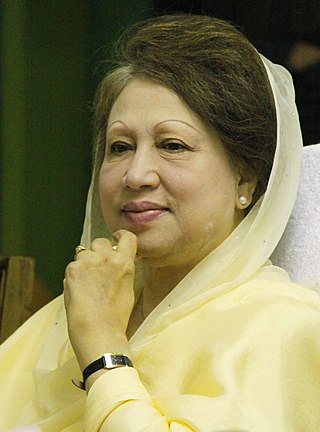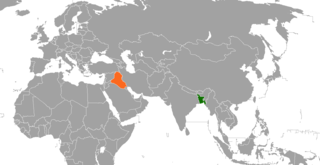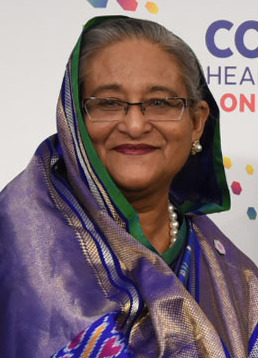A minimum wage is the lowest remuneration that employers can legally pay their employees—the price floor below which employees may not sell their labor. Most countries had introduced minimum wage legislation by the end of the 20th century. Because minimum wages increase the cost of labor, companies often try to avoid minimum wage laws by using gig workers, by moving labor to locations with lower or nonexistent minimum wages, or by automating job functions. Minimum wage policies can vary significantly between countries or even within a country, with different regions, sectors, or age groups having their own minimum wage rates. These variations are often influenced by factors such as the cost of living, regional economic conditions, and industry-specific factors.

The economy of Bangladesh is a major developing market economy. As the second-largest economy in South Asia, Bangladesh's economy is the 37th largest in the world in nominal terms, and 25th largest by purchasing power parity. Bangladesh is seen by various financial institutions as one of the Next Eleven. It has been transitioning from being a frontier market into an emerging market. Bangladesh is a member of the South Asian Free Trade Area and the World Trade Organization. In fiscal year 2021–2022, Bangladesh registered a GDP growth rate of 7.2% after the global pandemic. Bangladesh is one of the fastest growing economies in the world.

Sheikh Hasina Wazed is a Bangladeshi politician who has served as the prime minister of Bangladesh since January 2009. Sheikh Hasina was among Time's 100 most influential people in the world in 2018.

Janata Bank Ltd. is a state-owned commercial bank of Bangladesh established in 1972. Its headquarters is situated at Motijheel in Dhaka, the capital city of Bangladesh. It is the second largest commercial bank in Bangladesh. In 2019, Janata Bank had a fiscal deficit of 82.56 billion taka, the highest of any bank in Bangladesh ever. It's the best performing public bank in Bangladesh.

Khandaker Mosharraf Hossain is a Bangladeshi politician. He is the incumbent Jatiya Sangsad member representing the Faridpur-3 constituency since 2009. He served as a minister of the Minister of Labour and Employment, Minister of Expatriates' Welfare and Overseas Employment and Minister of Local Government and Rural Development and Co-operative.

Corruption in Bangladesh has been a continuing problem. According to all major ranking institutions, Bangladesh routinely finds itself among the most corrupt countries in the world.

Idris Ali is a Bangladeshi actor and activist. He appeared in more than 350 films during the 1980s and 1990s. He earned Bangladesh National Film Award for Lifetime Achievement (2021), Bangladesh National Film Award for Best Actor for his role in the film Parineeta (1986) and Best Supporting Actor for Shasti (2005). He is a road safety activist in Bangladesh. He was awarded Ekushey Padak for his social service by the Government of Bangladesh in 2018. He is the current President of Bangladesh Film Artists' Association.

The second Khaleda cabinet was the Government of Bangladesh during the 8th legislative session of the Jatiya Sangsad following the 2001 general election. The cabinet took office on 10 October 2001 and left office on 29 October 2006. The Prime Minister and head of the government was Khaleda Zia.

The Third Hasina ministry was the cabinet of the People‘s Republic of Bangladesh headed by Sheikh Hasina that was formed after the 2014 general election which was held on 5 January 2014. The Awami League was assured of victory, with its candidates declared victors in 127 of the 154 uncontested seats by default. The elected MPs and Cabinet were sworn in on 9 January.

The second Hasina cabinet was the Government of Bangladesh during the 9th legislative session of the Jatiya Sangsad following the 2008 general election, and serving from 6 January 2009 until 24 January 2014.
BASIC Bank Limited is owned bank in Bangladesh which was founded on 2 August 1988. The bank was founded to finance small enterprises. Abul Hashem is chairman of the bank. Md. Anisur Rahman is the managing director of the bank. More than 45 billion taka loan was defaulted from the bank, many of the loans were to companies that existed on paper only, with the support of former chairperson Sheikh Abdul Hye Bachhu. 100 borrowers accounted for 86 percent of the defaulted loans.

The Ministry of Expatriates' Welfare and Overseas Employment is a ministry of the government of the People's Republic of Bangladesh. It provided information, partnerships and facilitations for all matters related to overseas Bangladeshis and overseas employment.

Probashi Kallyan Bank is a state-owned bank in Bangladesh, a specialized financial institution for non-resident Bangladeshis.
Karmasangsthan Bank is a specialised government owned bank in Bangladesh. The bank was founded to finance the unemployed to set up small enterprises. Ansar-VDP Unnayan Bank and the Probashi Kallyan Bank are two specialised banks like the Karmasangsthan Bank in Bangladesh. MD. Nurul Amin is the present chairperson of the Karmasangsthan Bank.

The Government agencies in Bangladesh are state controlled organizations that act independently to carry out the policies of the Government of Bangladesh. The Government Ministries are relatively small and merely policy-making organizations, allowed to control agencies by policy decisions. Some of the work of the government is carried out through state enterprises or limited companies.

Bangladesh–Iraq relations refer to the bilateral relations between Bangladesh and Iraq. Bangladesh has an embassy in Baghdad. Iraq has an embassy in Dhaka.

The Bangladesh Secretariat, also known as Bangladesh Sachibalaya or Old Secretariat, is the administrative headquarters of the Government of Bangladesh, and houses the majority of ministries and government agencies and bodies. The secretariat can refer to the complex of ministries, or refer to the Bangladesh Civil Service central administration. Its political heads are the ministers while the administrative heads are the Secretaries to the Government. It is located in Bangladesh's capital city of Dhaka. The Secretariat complex was originally constructed as Secretariat of East Pakistan.
Lutfor Rahman Khan Azad is a Bangladesh Nationalist Party politician and a former Jatiya Sangsad member representing the Tangail-3 constituency. He served as the state minister of 5 different ministries during 2001–2006 in the Second Khaleda Cabinet - Ministry of Science and Technology, Ministry of Labour and Employment, Ministry of Jute, Ministry of NGO Affairs, and Ministry of Expatriates' Welfare and Overseas Employment.

The Fourth Hasina ministry is the current cabinet of Bangladesh headed by Prime Minister of Bangladesh Sheikh Hasina which was formed after the 2018 general election which was held on 30 December 2018. The results of the election were announced on 31 December 2018 and this led to the formation of the 11th assembly in the Jatiya Sangsad. The swearing-in ceremony was arranged in Bangabhaban in the Capital.
Wages Earners’ Welfare Fund is a Bangladesh government fund that was created for the welfare of migrant workers and financed by mandatory contributions from migrant workers under the Ministry of Expatriates' Welfare and Overseas Employment. It is managed by the Wage Earners' Welfare Board.













